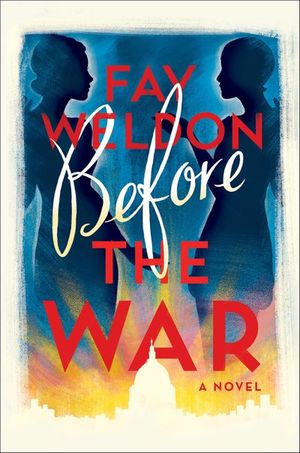Before the War
Published by St. Martin's Publishing Group
A pregnant woman takes a husband in Edwardian London in this witty novel of love, death, and aristocracy by the author of The Life and Loves of a She-Devil.
“A daredevil combination of farce and satire, pathos and bathos, written in a post-modernist, self-referential style, which effervesces its eccentric way through . . . pages that carry shades of Oscar Wilde, Evelyn Waugh, P. G. Wodehouse, and John Fowles.” —The Times Literary Supplement (UK)
London, 1922. It’s a cold November morning, the station is windswept and rural, the sky is threatening snow, and the train is late. Vivien Ripple, twenty years old and an ungainly five foot eleven, waits on the platform at Dilberne Halt. She is wealthy and well-bred—only daughter to the founder of Ripple & Co, the nation’s top publisher—but plain, painfully awkward, and, perhaps worst of all, intelligent. Nicknamed “the giantess,” Vivvie is, in the estimation of most, already a spinster. But she has a plan. That very morning, Vivvie will ride to the city with the express purpose of changing her life forever.
Enter Sherwyn Sexton: charismatic, handsome—if, to his dismay, rather short. He’s an aspiring novelist and editor at Ripple & Co whose greatest love is the (similarly handsome, but taller) protagonist of his thriller series. He also has a penchant for pretty, young women—single and otherwise. Sherwyn is shocked when his boss’s hulking daughter, dressed in a tweed jacket and moth-eaten scarf, strides into his office and asks for his hand in marriage. But his finances are running thin to support his regular dinners on the town, and Vivien’s promise to house him in comfort while he writes is simply too good to refuse. What neither of them know is that she is pregnant by another man, and will die in childbirth in just a few months . . .
With one eye on the present and one on the past, Fay Weldon offers Vivien’s fate, along with that of London between World Wars I and II: a city fizzing with change, full of flat-chested flappers, shell-shocked soldiers, and aristocrats clinging to history.
Inventive, warm, playful, and full of Weldon’s trademark ironic edge, Before the War is a spellbinding novel from one of the greatest writers of our time.
“Old and new readers of Fay Weldon should heed her call because this is a feminist continuing to engage with her culture’s shortcomings and having an awful lot of fun along the way.” —The Washington Post
“A catty, chatty look at a family that from the outside may seem all Downton Abbey, but which, behind the façade, is full of characters who are anything but the post-Edwardian ideal. . . . [An] eminently readable inter-generational, inter-war-years saga.” —Historical Novel Society
“A daredevil combination of farce and satire, pathos and bathos, written in a post-modernist, self-referential style, which effervesces its eccentric way through . . . pages that carry shades of Oscar Wilde, Evelyn Waugh, P. G. Wodehouse, and John Fowles.” —The Times Literary Supplement (UK)
London, 1922. It’s a cold November morning, the station is windswept and rural, the sky is threatening snow, and the train is late. Vivien Ripple, twenty years old and an ungainly five foot eleven, waits on the platform at Dilberne Halt. She is wealthy and well-bred—only daughter to the founder of Ripple & Co, the nation’s top publisher—but plain, painfully awkward, and, perhaps worst of all, intelligent. Nicknamed “the giantess,” Vivvie is, in the estimation of most, already a spinster. But she has a plan. That very morning, Vivvie will ride to the city with the express purpose of changing her life forever.
Enter Sherwyn Sexton: charismatic, handsome—if, to his dismay, rather short. He’s an aspiring novelist and editor at Ripple & Co whose greatest love is the (similarly handsome, but taller) protagonist of his thriller series. He also has a penchant for pretty, young women—single and otherwise. Sherwyn is shocked when his boss’s hulking daughter, dressed in a tweed jacket and moth-eaten scarf, strides into his office and asks for his hand in marriage. But his finances are running thin to support his regular dinners on the town, and Vivien’s promise to house him in comfort while he writes is simply too good to refuse. What neither of them know is that she is pregnant by another man, and will die in childbirth in just a few months . . .
With one eye on the present and one on the past, Fay Weldon offers Vivien’s fate, along with that of London between World Wars I and II: a city fizzing with change, full of flat-chested flappers, shell-shocked soldiers, and aristocrats clinging to history.
Inventive, warm, playful, and full of Weldon’s trademark ironic edge, Before the War is a spellbinding novel from one of the greatest writers of our time.
“Old and new readers of Fay Weldon should heed her call because this is a feminist continuing to engage with her culture’s shortcomings and having an awful lot of fun along the way.” —The Washington Post
“A catty, chatty look at a family that from the outside may seem all Downton Abbey, but which, behind the façade, is full of characters who are anything but the post-Edwardian ideal. . . . [An] eminently readable inter-generational, inter-war-years saga.” —Historical Novel Society
BUY NOW FROM
COMMUNITY REVIEWS

